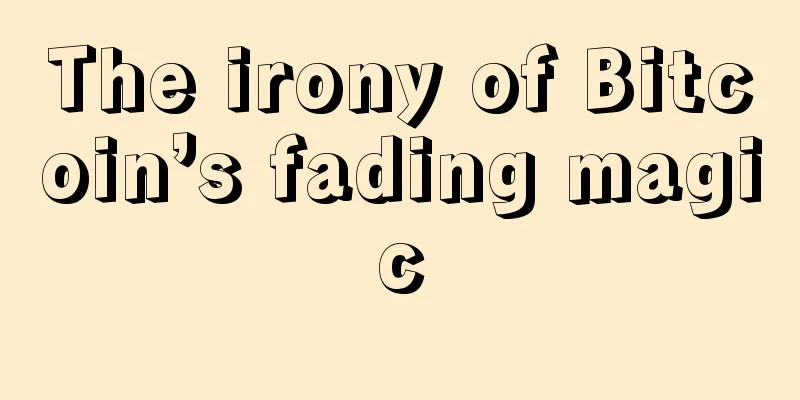The irony of Bitcoin’s fading magic

|
Bitcoin — a decentralized, (mostly) digital currency that is neither issued nor backed by central banks — has always seemed like some kind of magic trick. Rather than turning straw into gold, Bitcoin converts excess computing power into money that people will accept as payment. Radical libertarians have been eager to trust Bitcoin because they hope the currency will solve the following dilemma. They prefer markets to politics and have a strong distrust of the state. But the modern state has a virtual monopoly on the money that markets need to work. If widely accepted, Bitcoin will challenge the dominance of the state over the economy. Bitcoin is designed to prevent the state or other entity from monopolizing, instead creating a new currency based on shared information that is difficult for any one entity to gain control of. Politics disappears, replaced by a combination of imagined technology and cryptographic verification. Alas, the magic is wearing off. Some of the technical innovations associated with Bitcoin will survive. Its political vision will not. Rather than overcoming conventional politics, Bitcoin is succumbing to it. The biggest disputes center on bitcoin’s most innovative element: the blockchain, a decentralized ledger that records bitcoin transactions. Bitcoin “miners” compete to crack computationally difficult problems. The winners receive new bitcoins while also verifying a “block” of pending transactions, which are then added to the ledger and shared with the community. The system was designed to replace third-party regulators with decentralized authorities. It was starting to break down for technical reasons. The small size of each block meant the system could only process a few transactions at a time. As more people began using Bitcoin, the system became less reliable. The problem is that a solution requires political agreement. There is no central authority within Bitcoin, so no one can impose a mandate. Bitcoin's inventor, who goes by the pseudonym Satoshi Nakamoto, appears to have disappeared years ago, leaving behind an increasingly contentious community to debate major decisions. Some influential members of the Bitcoin network want to change the Bitcoin protocol to make blocks larger so that more Bitcoins can be released each time and transactions can be processed faster. Others responded with anger, saying that doing so would destroy Bitcoin. Fundamentally changing the Bitcoin protocol would "fork the chain," potentially creating two different currencies that cannot be reconciled: one wanted by those who accept the change, and another wanted by those who oppose the change. Others want to move key parts of transaction processing off the blockchain and rely more on “side chains,” an idea that has also sparked controversy: Side chains could turn bitcoin’s unified approach into a jumble of quasi-compatible proprietary solutions. The main proposal to form a chain fork requires 75% of the Bitcoin network to agree before it can be fully implemented. However, no one has the power to prevent people from influencing opinions in an unfair way. Companies such as Coinbase, which operates a Bitcoin "wallet" and exchange business, that support the change in the protocol have been hit by distributed denial of service attacks aimed at kicking their servers off the Internet. After being threatened, people on both sides have left the Bitcoin network. This confusion illustrates the main problem with tech libertarianism. It doesn’t escape politics; it just temporarily displaces and hides them. As Bitcoin becomes more successful, it becomes potentially more profitable. Ideology gives way to disputes over who gets what. It turns out that libertarians are not very good at figuring out how to resolve such political conflicts. As these disputes become more public, they will damage Bitcoin beyond its core enthusiasts. Bitcoin advocates are absolutely right about one thing. Money is a kind of confidence trick, a "frozen desire," as the writer James Buchan describes it. We believe in it only because everyone else does. So if Bitcoin's believers believe in it enough and can convince others to do the same, they have a chance to make it accepted. That’s much harder today. Bitcoin’s seeming value depends on people suspending their disbelief. It’s hard to see the illusion working when magicians are grappling with each other on stage. |
<<: Chinese hackers and Bitcoin ransomware
Recommend
Detailed explanation of the numerological meaning of the eyes, the supervisor of the five senses
Eyes are the windows to the soul and can reveal a...
The more wealth you have, the more troubles you will suffer.
Most people have a very strong desire for money, ...
Rosenblatt analyst: TSMC and Samsung mining chip orders may drop by 50%
According to Bloomberg, Rosenblatt analyst Jun Zh...
Is it good for a woman to have a mole on the left side of her nose?
Moles on the face will be very obvious. After all...
Can I protect my rights if I lose $1 million from a contract liquidation on a virtual currency exchange?
The world of emerging technologies such as Web3.0...
Face analysis: middle-aged developed male face
1. Black hair In physiognomy, if a man's hair...
When you are treated unfairly, you will only remember the face in your heart
When a person is treated unfairly, he or she will...
Is it good for a woman to have a nose as sharp as a knife? A woman's nose is as sharp as a knife
Appearance is determined by the heart. Appearance ...
What kind of nose looks good?
What kind of nose is good? Is it better to have a...
What kind of face does a woman have? She is destined to marry late.
Many times, late marriage or early marriage is de...
Does a man with crow's feet when he smiles mean he will be unfaithful?
Does a man with crow's feet when he smiles me...
The face of a woman with a philandering heart
What does a philandering woman look like? What ki...
Why has the issuance of digital currency by central banks become a global trend?
On January 20, 2016, the People's Bank of Chi...
How to find the best partner by looking at face
Although finding a partner is only the first step...
What are the facial features of a lucky man?
What are the facial features of a lucky man? Peop...









